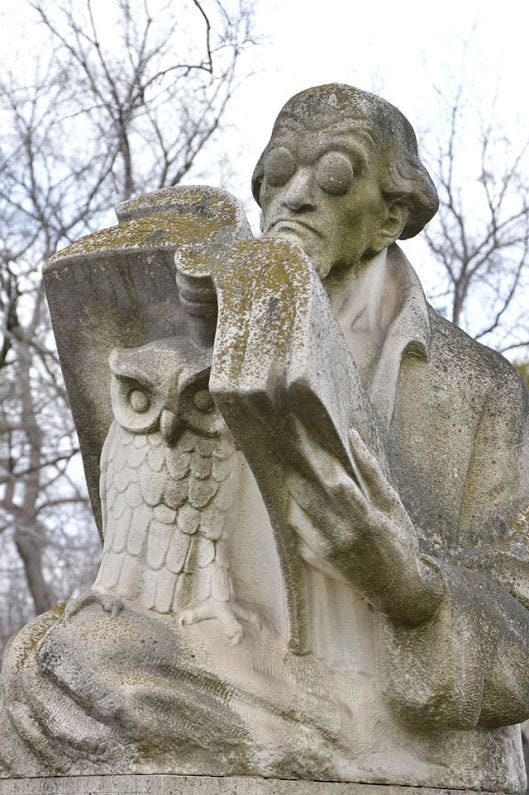I’ve been thinking a lot about poetry lately, how some speaks to me and some not at all. While reading recent issues of prestigious literary journals, I was surprised to find that not one poem—not one!—moved me. Amazing.
Most seemed like intellectual exercises or obtuse offerings of random thoughts and images. None engaged me intellectually, or stimulated my sensibilities, or even challenged me—let alone invited me—to a second reading. Instead they were studies in disappointment. I left them unfulfilled, still hungry, and, admittedly, cranky.
Is it me? Is it them? (Sigh).
Just what is it I crave from poetry?
William Carlos Williams once famously said you can’t get the news from poems, “yet men die miserably every day for lack of what is found there.”
That’s what I want: The thing we die from lack of. That’s why I read poetry. What I look for in other works of art too—in prose and painting and music that rise to the level of poetry.
I want what Emily Dickinson referred to when she says, “If I feel physically as if the top of my head were taken off, I know that is poetry.” Something that tickles the hintermost parts of my brain, where I feel the synapses stretch and snap, reaching toward something just past my grasp.
I want what T.S. Elliot meant to when he writes that “poetry is a raid on the inarticulate.” Something dark and dormant, lying just below consciousness, rising into the light: a curved fin, a humped back, gliding momentarily along the surface of thought before dipping below again.
We have all felt that, I’m sure. Something deep and delicious, once known and now forgotten, woken momentarily. Something within us re-ignited, flashing briefly before dissolving into darkness again.
In “Ars Poetica” Archibald MacLeish says: A poem should be palpable and mute / As a globed fruit.
A poem should be wordless / As the flight of birds.
He says:
For all the history of grief
An empty doorway and a maple leaf.
For love
The leaning grasses and two lights above the sea—
Reading his poem, I’m with him. I’m saying, Yes!
But he loses me with the last two lines:
A poem should not mean
But be.
Pointing to something static. Not in motion. Art for art’s sake. An artifact showcased in a museum.
Gwendolyn Brooks writes:
Does man love Art? Man visits Art, but squirms.
Art hurts. Art urges voyages–
And it is easier to stay at home,
The nice beer ready.
If it doesn’t make us squirm, if it doesn’t hurt, if it doesn’t urge voyages, is it art? Is it poetry?
Wallace Stevens calls modern poetry “the poem of the mind.” It’s “the act of finding what will suffice.”
He says:
It has
To construct a new stage. It has to be on that stage,
And, like an insatiable actor, slowly and
With meditation, speak words that in the ear,
In the delicatest ear of the mind, repeat,
Exactly, that which it wants to hear, at the sound
Of which, an invisible audience listens,
Not to the play, but to itself, expressed
In an emotion as of two people, as of two
Emotions becoming one.
A poem must construct something that it inhabits, that speaks to the reader, in the “delicatest ear of the mind,” “exactly, that which it wants to hear,” what the reader, that invisible audience, wants to hear—which is not the play, not the poem, but “itself.” Itself “expressed / In an emotion as of two people, as of two emotions becoming one.”
It must
Be the finding of a satisfaction, and may
Be of a man skating, a woman dancing, a woman
Combing. The poem of the act of the mind.
Stevens is saying that a poem can no more “be” than “mean.” Rather, it must act. It must unite poet and reader in the act of finding what will suffice.
It is not static: It is “a man skating, a woman dancing, a woman combing.” It is always moving. It moves us to capture it in its passing. It moves us beyond ourselves, where the top of our head lifts away and there we go unbounded, grasping for a brief moment what lies always, already, just beyond our grasp.
That which suffices. That from which the lack thereof we die of every day. That’s what I’m looking for when I read poetry.
I want to feel my synapses snapping.
Your support means a lot to me. If you enjoyed this, please let me know with a like, a comment, or a subscription. It’s free!





Deborah, I had a similar experience with visual art as you had with the literary journal and not feeling inspired by a lot of the poetry. I have been in NYC this weekend and decided to visit the Whitney Biennial, which is a survey of contemporary art that is held every two years. To be honest, I left the museum feeling uninspired by most of the artwork I saw there. However, we took a short walk to the Gagosian gallery, just a few blocks north, and caught the final day of the Francesca Woodman exhibit. I was captivated and inspired by every single photo displayed there. It was such a refreshing experience and it reaffirmed my absolute love for Woodman's art. I definitely left the exhibit feeling my synapses snapping and very grateful that I had the chance to see it. The Whitney was an enjoyable visit, but none of the pieces truly touched me like Woodman's.
I understand; I too desire the top of my head to be taken off, dear Em."
As for paraphrasing Keats' famous lines, you could say:
"Poetry is truth, truth poetry – that is all you need to know on earth.
Best :)